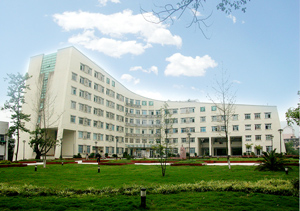Introduction for biotechnology center
Founded in1993, and recognized as the Key Laboratory of Ministry of Agriculture in 2002, Biotechnology Research Center of Southwest University is a productive and competitive lab in agro-biotechnology. Presently, 15 faculties and staffs are working here, including 4 professors, 7 associate professors and 3 technicians. The laboratory director is professor Yan Pei.
Currently, the main projects in our laboratory focus on:
Genetic and molecular basis of cotton fiber development and cotton fiber improvement
We make great efforts to elucidate how plant hormones and their interactions regulate cotton fiber cell development and how to manipulate the expression of the plant hormone biosynthesis and signaling genes to improve cotton fiber quality and yield. As well as investigation of plant hormones, we are also characterizing other genes involving cotton fiber initiation, elongation and secondary cell wall accumulation. Meanwhile, using the approach of genetic modification, we are engaging in cotton breeding with high yielding and high quality.
Transgene deletion in GMs for biosafety
We also developed a new recombination system characterized with highly efficient in deleting all functional transgenes from the pollen, seed or both of tobacco plants. This system can be applicable for vegetatively propagated plants. We are now engaged in establishing a new two-component transcript activation system for gene deletion in hybrid crops, such as rice, maize and canola.
Molecular basis of insect fungal diseases
Research in our laboratory is also emphasized on molecular basis of insect fungal diseases. We had cloned several cuticle-degrading enzyme genes, e.g., proteinase or chitinase genes, from Beauveria bassiana, a widely used entomopathogenic fungi in insect pest control. Then, we utilized a chitin-binding domain from an insect, the silkworm moth (B. mori), to produce an engineered chitinase and proteinase in the insect pathogen B. bassiana. The engineered chitinase and proteinase showed increased kinetic properties in substrate hydrolysis than those of the wild-type chitinase and proteinase. Furthermore, when the engineered chitinase and proteinase were overexpressed in B. bassiana, respectively, the genetically modified fungus showed an increase in virulence over a strain with a constitutively expressed native chitinase or proteinase gene. We have demonstrated a strategy where genetic components of the hostinsect can be incorporated into the fungal pathogen in order to increase host cuticle penetration ability. To isolate new genes involved in infection, we have set up a T-DAN insertion mutant pool of B. bassiana. Some interesting genes had been cloned and characterized from this pool.
Our laboratory is well-equipped for gene cloning, gene function analysis, genetic transformation, purification of bio-macromolecule and microbial fermentation, including DNA sequencers, the real-time PCR, the 2-D system, GC-MS and LC-MC, capillary electrophoresis and scanning electron microscopes, and the Confocal microscope.
Grants for our current research projects are mainly from “The Major State Basic Research Development Program of China (973)”, “Hi-Tech Research and Development Program of China (863)”, the National Plant Transgenic Program, and the National Natural Science Foundation of China.
Actually, this is an attracting place for science study. Students will get well training and have opportunities to show their talents here.
